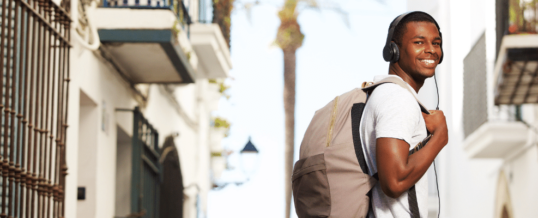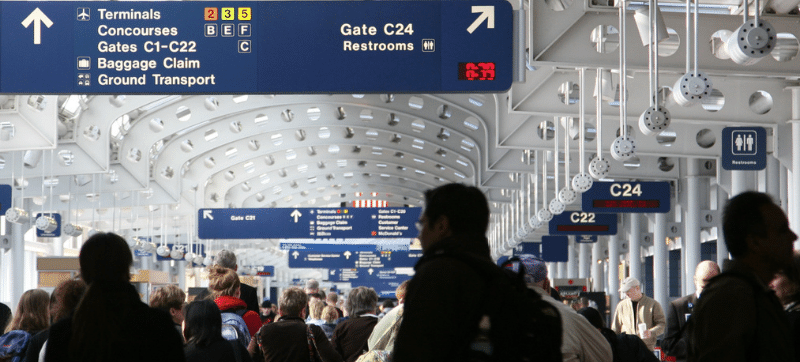
By Alex Stratikis, Autistic Traveler & Founder of Autism Adventures Aboard
Instagram: @autismadventuresabroad
Overload is something that individuals will have to deal with in their daily routines, and this continues to be the case when you travel as well. Overload (the feeling of being overwhelmed) comes with being an autistic person, and I have yet to interact with a community member who hasn’t felt overloaded at least once in their life. The resulting emotions can often lead to a meltdown. There are no single coping skills that will work for everyone; this article is not comprehensive. However, based on my own personal experiences, I will share some healthier tips and strategies that I use in my life, including traveling.

1. Overload is commonly a direct result of over-socialization and overstimulation. External factors trigger the feeling of being overburdened, so a good starting point is to recognize and understand what external forces may act as triggers and lead to you feeling overwhelmed. While on vacation, you might find yourself packing a lot into your itinerary, especially if you are only on a short weekend trip away – which translates into not getting much alone time to decompress. This is probably one of the biggest causes of my overload while traveling. Being overly stringent with your routine is another common trait. I recommend not planning itineraries for your upcoming trip, as there is usually an inclination to either pack too much into it or try to follow your itinerary precisely until the end of your trip – which can be stressful, in my experience.

2. Travel can be unpredictable. Delays, cancellations, and weather changes are familiar factors that can make your plans tumble. But, by practicing spontaneity, you can help avoid disappointment by not attaching expectations to your plans. I now advocate for a “play it by ear” approach. Research which places and attractions you want to see, and if writing these down helps give you a better idea of what to do during your vacation, then do that – and book anything in advance that may require you to do so. Almost all my best travel experiences resulted from keeping an open mind and schedule. Should circumstances change, or I meet people along the way that I connected with and wanted to spend more time with, I can because I have some flexibility in my schedule.
3. Although we know certain triggers can cause autistic individuals to experience overload and/or meltdown; these triggers are not predetermined and vary from person to person. However, some common triggers listed by many autistic people include loud noises, large crowds, feelings of entrapment, unrealistic demands placed upon them, and painful or uncomfortable interactions. My advice is always to avoid or minimize any triggers you recognize while traveling and in your day-to-day life. Self-care should always be a priority, and you should never feel guilty for removing yourself from a person or situation if you begin to feel overwhelmed.

4. Another thing that helps me to decompress is nature therapy. No matter where you are in the world, you will probably be able to find a green space. Even the largest and busiest cities in the world have their fair share of public parks and rooftop gardens. Being in nature is one of my favorite ways to be alone with my thoughts and recompose myself after feeling overwhelmed. Sometimes I’ll take food and a book with me so that I know I can chill out and spend as long in that green space as I need. There’s a lot of evidence on the benefits of being in nature in general, and I feel the therapeutic effects myself.

5. Music can also be an escape for many people. It’s no secret that the therapeutic effects of music can help deal with complex thoughts, feelings, and emotions. It’s the human construct that we can find comfort in music. Sometimes, relieving myself of overload can be a case of picking up my headphones, lying on my bed, or finding a quiet spot and playing my favorite songs from my playlist until I feel ready to continue.

6. Sensory toys (fidget toys) are something else to think about. These toys come in a wide range of shapes and sizes. So, there should be something for everyone! You will find that many of these toys are a handy size for convenient travel use. They can prove helpful in dealing with overload, as there are numerous benefits, namely increasing concentration and reducing stress/anxiety when feeling overwhelmed. It’s always a good idea to pack one or more with you before beginning your adventure, just in case you might need them later in the journey.

7. Lastly, something I find helps me with overload is exercise. Admittedly, I don’t engage in this as much when I’m traveling – except for walking, which I feel makes up for any deficit. Exercise is a great way to clear one’s mind and decompress, as it aids in reducing stress, even in the most demanding of times. Not only is it physically healthy for your body, but it is also mentally healthy when used as a coping mechanism. While I do not engage in yoga, I have heard a lot of the benefits from other community members – so that might also be another good option to consider! I prefer workouts from home over the gym. However, you can partake in psychical activity from your hotel, other vacation accommodation or outside in an open space when traveling.
These tips and strategies have proven helpful in my experience, and I hope you can benefit from these as well. Just remember you know yourself best and what triggers you face, so adjust your plans accordingly and give yourself a break. And for parents, you understand your child’s needs best, so make sure to consider what routines and tips best fit their needs.
If you want to know more about my travel experiences and destinations, please follow me on Instagram at “@autismadventuresabroad” or join my mailing list on my new website at www.autismadventuresabroad.com. You can also visit my Go Fund Me Page by clicking on this link https://gofund.me/cc62791d.
Looking for Ways to Make Your Organization or Facility More Inclusive?
Please fill out the form below to get connected with a team member for more information about IBCCES’ Certified Autism Center™ Designation
SEP
